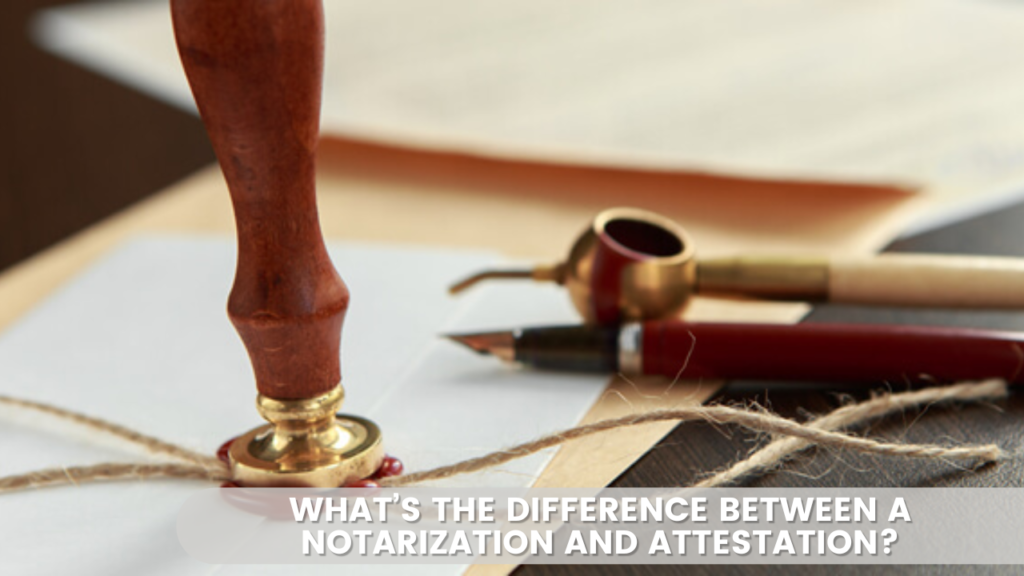Navigating legal documents can be a complex task, especially when it comes to understanding the processes that verify their authenticity. Notarization and attestation are two crucial methods used globally to validate documents, each serving distinct purposes and following specific protocols. This article explores the fundamental differences between notarization and attestation, providing clarity on when and why each is required.
Definition of Notarization
Notarization is a formal process by which a notary public verifies the authenticity of signatures on a document. This involves the notary confirming the identity of the signatories, ensuring they are signing voluntarily, and acknowledging that they understand the contents of the document. The notary then affixes their official seal and signature, indicating that the document has been duly notarized.
Definition of Attestation
Attestation, on the other hand, is the act of witnessing the signing of a document and verifying its authenticity. Unlike notarization, attestation can be performed by any credible witness, although in some cases, specific qualifications may be required. The witness attests to the fact that the document was signed in their presence and that the signatory appeared to be of sound mind and acted willingly.
Historical Background of Notarization and Attestation
The practice of notarization dates back to ancient Rome, where scribes known as notarii recorded legal agreements and authenticated documents. Similarly, attestation has historical roots in early legal systems where witnesses played a crucial role in validating the execution of legal documents. Over time, these practices have evolved, adapting to modern legal frameworks while retaining their core purposes of ensuring authenticity and preventing fraud.
For those needing professional notary services, understanding the nuances between notarization and attestation can help ensure you choose the appropriate method for your legal documents.
Purpose of Notarization
The primary purpose of notarization is to deter fraud and ensure the integrity of legal documents. By involving a notary public, notarization adds a layer of verification that the signatories are who they claim to be and that the document was signed willingly and knowingly. This process is essential in transactions that require a high degree of trust and legality, such as real estate deals, power of attorney, and affidavits.
Purpose of Attestation
Attestation serves to affirm the authenticity of a document and the veracity of its contents. It provides legal assurance that the document was executed correctly and that the parties involved were competent and willing participants. Attestation is often required for documents used in court proceedings, administrative processes, and various official transactions to ensure they are genuine and legally binding.
Key Differences Between Notarization and Attestation
The primary difference between notarization and attestation lies in who performs the verification and the scope of their authority. Notarization is performed by a notary public, a state-appointed official with the authority to certify documents. Attestation, however, can be performed by any credible witness, depending on the specific requirements of the document in question. Additionally, notarization involves a formal process with an official seal, whereas attestation generally requires the witness’s signature and possibly a statement of witnessing.
When you’re considering whether notarization or attestation is necessary, you might also explore the convenience of mobile notary services, which can bring notary services directly to you.
Legal Implications of Notarization
Documents that are notarized carry significant legal weight. The notary’s seal and signature serve as evidence that the document was executed properly, which can be crucial in legal disputes. Notarized documents are often required in legal settings because they provide a higher level of verification and are less likely to be challenged in court.
Legal Implications of Attestation
Attested documents are also legally recognized, but their validity can be more easily contested than notarized documents. The credibility of the witness can come into question, and without the formal authority of a notary public, attested documents may face greater scrutiny. However, attestation is still a vital process in many legal contexts, providing necessary assurance of authenticity and proper execution.
Common Documents Requiring Notarization
Notarization is often required for documents such as:
- Real estate deeds and mortgages
- Affidavits and sworn statements
- Powers of attorney
- Wills and trusts
- Loan agreements
These documents typically involve significant legal and financial consequences, making notarization essential to ensure their validity.
Common Documents Requiring Attestation
Documents that commonly require attestation include:
- Contracts and agreements
- Statutory declarations
- Birth and marriage certificates
- Educational certificates
- Medical records and reports
Attestation is used to affirm the authenticity of these documents for various administrative and legal purposes.
The Process of Notarization
The notarization process involves several steps:
- Verification of Identity: The notary public verifies the identity of the signatories using valid identification documents.
- Witnessing the Signature: The notary ensures that the signatories sign the document in their presence.
- Acknowledgment: The notary confirms that the signatories understand the document and are signing it voluntarily.
- Certification: The notary affixes their official seal and signature to the document, completing the notarization process.
The Process of Attestation
Attestation typically involves the following steps:
- Verification: The witness verifies the identity of the signatory.
- Witnessing the Signing: The document is signed in the presence of the witness.
- Statement of Witnessing: The witness may provide a written statement affirming that the document was signed in their presence and the signatory appeared competent and willing.
- Signature: The witness signs the document, completing the attestation process.
Roles and Responsibilities of a Notary Public
A notary public is responsible for:
- Verifying the identity of signatories
- Ensuring that documents are signed willingly and knowingly
- Maintaining a record of notarized documents
- Preventing fraud by adding a layer of verification
- Affixing their official seal and signature to documents
Roles and Responsibilities of an Attesting Witness
An attesting witness is responsible for:
- Verifying the identity of the signatory
- Witnessing the signing of the document
- Providing a statement of witnessing, if required
- Signing the document to attest to its authenticity
Knowing the difference between notarization and attestation is crucial when dealing with sensitive processes such as an FBI background check, where document authenticity is paramount.
Notarization and Attestation in Different Jurisdictions
The requirements for notarization and attestation can vary significantly between jurisdictions. In some regions, notarization may involve more rigorous processes and require additional qualifications for notaries public. Similarly, attestation requirements may differ based on the type of document and the legal context in which it will be used.
The Importance of Notarization in Real Estate Transactions
Notarization is particularly important in real estate transactions, where the transfer of property involves significant financial and legal implications. Notarized documents provide assurance that the transaction is legitimate and that all parties involved have been properly identified and have willingly agreed to the terms.
The Importance of Attestation in Legal Proceedings
In legal proceedings, attestation serves as a critical means of verifying the authenticity of documents presented as evidence. Attested documents ensure that the information they contain is accurate and that the parties involved are credible, which is essential for the fair adjudication of cases.
Challenges in Notarization
Notarization can present several challenges, including:
- Accessibility: Finding a notary public may be difficult in some areas.
- Costs: Notarization services can be expensive, especially for complex documents.
- Fraud Prevention: Despite the safeguards, fraudulent notarizations can occur.
Challenges in Attestation
Attestation also has its challenges, such as:
- Credibility: The credibility of the witness can be questioned.
- Variability: Attestation requirements can vary widely, leading to inconsistencies.
- Legal Validity: Attested documents may face greater scrutiny in legal contexts.
Technological Advances in Notarization
Technological advancements have introduced electronic notarization (e-notarization), allowing notaries to perform their duties remotely. This innovation has increased accessibility and convenience, especially during times when in-person meetings are challenging.
Technological Advances in Attestation
Similarly, technology has facilitated electronic attestation, enabling witnesses to verify and sign documents online. Digital platforms ensure secure and efficient attestation processes, maintaining the integrity and authenticity of documents.
How to Choose Between Notarization and Attestation
Choosing between notarization and attestation depends on the specific requirements of the document and the legal context. Considerations include the legal weight of the document, the necessity for a formal seal, and the jurisdictional requirements.
Notarization vs. Attestation: Which One Do You Need?
Determining whether notarization or attestation is needed involves understanding the purpose of the document and the legal framework governing its use. For documents requiring high levels of authentication, notarization is typically preferred. For less formal or administrative purposes, attestation may suffice.
Costs Associated with Notarization
The costs of notarization can vary widely, depending on factors such as the complexity of the document, the location, and the notary’s fees. It is essential to understand these costs upfront to avoid unexpected expenses.
Costs Associated with Attestation
Attestation costs are generally lower than notarization, but they can still vary based on the type of document and the requirements for the attesting witness. Some witnesses may charge fees, while others may provide attestation services for free.
Ensuring Authenticity and Fraud Prevention in Notarization
To ensure authenticity and prevent fraud in notarization:
- Verify the identity of all parties with valid ID
- Maintain detailed records of notarized documents
- Use secure methods for affixing seals and signatures
- Stay updated with legal requirements and best practices
Ensuring Authenticity and Fraud Prevention in Attestation
For attestation:
- Verify the signatory’s identity thoroughly
- Ensure the signing is witnessed in person
- Provide a clear statement of witnessing
- Use secure methods for document handling and storage
Case Studies: Real-World Applications of Notarization and Attestation
Case studies highlight the practical applications of notarization and attestation. For instance, in a real estate transaction, notarization ensures that the deed is valid and enforceable. In a court case, attestation of a witness statement can provide crucial evidence for legal proceedings.
Future Trends in Notarization and Attestation
Future trends include increased digitization and the use of blockchain technology to enhance the security and verifiability of notarized and attested documents. These advancements will likely make the processes more efficient and accessible while maintaining high standards of authenticity and fraud prevention.
Conclusion
Understanding the difference between notarization and attestation is essential for anyone involved in legal documentation. Both processes serve to verify the authenticity of documents, but they do so in different ways and are suited to different contexts. Whether you need the formal verification of a notary public or the witnessing of a credible individual, knowing which process to use can ensure your documents are legally sound and properly authenticated.
FAQs about Notarization and Attestation
What is the main difference between notarization and attestation?
Notarization is performed by a notary public who verifies the identity of signatories and ensures they sign willingly, whereas attestation can be done by any credible witness who confirms the document was signed in their presence.
When is notarization required?
Notarization is often required for legal documents that involve significant financial or legal consequences, such as real estate deeds, affidavits, and powers of attorney.
Can a document be both notarized and attested?
Yes, in some cases, a document may require both notarization and attestation to meet specific legal requirements or provide additional verification.
How does electronic notarization work?
Electronic notarization allows notaries to perform their duties remotely using secure digital platforms, which verify the identity of signatories and affix digital seals and signatures.
What are the risks of not properly notarizing or attesting a document?
Improper notarization or attestation can lead to disputes over the document’s validity, legal challenges, and potential financial or legal repercussions.
Are there any costs associated with notarization and attestation?
Yes, both processes can involve costs. Notarization fees vary based on the complexity of the document and location, while attestation fees depend on the requirements and the witness’s discretion.


